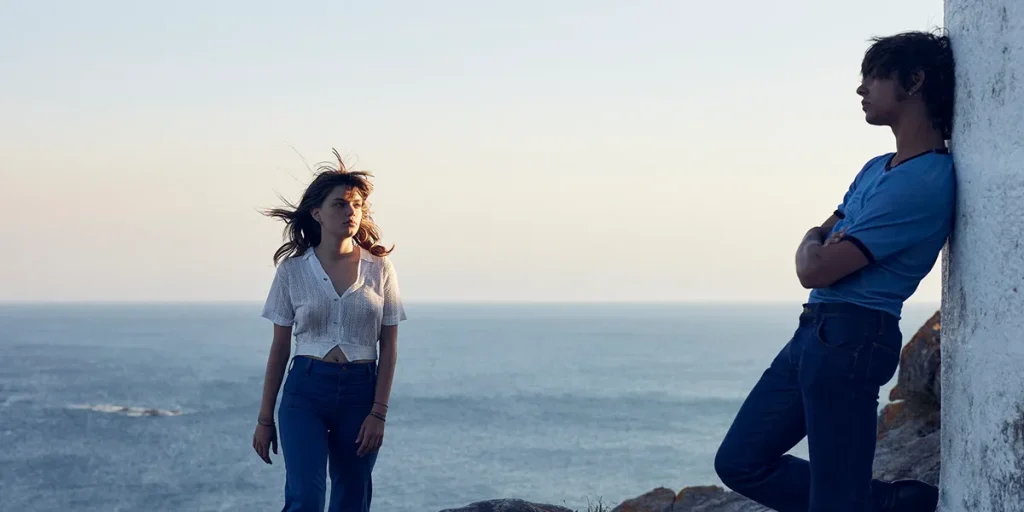Carla Simón’s sun-kissed Romería sees the director draw from her own life again for a very reserved drama about a teenager meeting a family she never knew she had.
Writer-Director: Carla Simón
Genre: Drama
Run Time: 114′
BFI London Film Festival Screening: October 9-10, 2025
U.S. Release Date: TBA
U.K. Release Date: TBA
Carla Simón’s sun-kissed Romería starts with our protagonist needing a signature. It’s July 2004, and 18-year-old Marina (discovered talent Llúcia Garcia, who is a magnetic presence) has lived in Barcelona after the death of both her parents. She is applying for a scholarship to study film, but needs documents that prove she is related to her father Fon.
For those, she needs the signature of grandparents she has never met. So, armed with a digital camcorder, Marina travels to the northwestern coastal city of Vigo, Galicia, to meet her rich and (mostly) welcoming extended family. She also seeks information on who her father was, and has her mother’s diary to help her.
However, it turns out that there are a lot of gaps and different recollections in the family’s story. For one thing, Fon apparently died a lot later than the date Marina was told. And as she hangs out with different family members, including cousin Nuno (Mitch), she faces difficult truths about her parents and what happened to them.
Simón is a filmmaker who has consistently used personal history and themes of her family in her work. Her debut, Summer 1993, was about a girl who moves to Barcelona after the death of her mother to live with her aunt and uncle. Her Golden Bear winner Alcarràs was not semi-autobiographical, but it was focused on family ties and was named after the town where she grew up. Now, Simón draws from her own life and experiences once again for Romería, whose title comes from the Spanish word for pilgrimage. Simón lost both of her parents to AIDS and has spoken of her frustration with not fully knowing their story. Therefore, she has created this film as a tale of uncovering that hidden history.
The main point of Marina’s romería to Vigo is to be recognised as her father’s daughter. But her presence – and, as her aunts and uncles note, her resemblance to her mother – has revived moments from a long-forgotten past. Notably, the memory of Marina’s parents’ addiction to heroin and their eventual deaths from HIV/AIDS, which (alongside a drugs epidemic) claimed so many lives from Spain’s ‘La Movida’ generation. There is also the stigma from this time, with the fact that Fon’s family hid him away from the world. All this is made very much clear by the time Marina’s new grandfather (José Ángel Egido, Mondays in the Sun) offers loads of money instead of the scholarship, likely as a bribe to make all this disappear.
This intimate story is presented in Simón’s usual naturalistic way. Details are very much inferred, with interpersonal conflicts overheard by Marina and the attentive camera. The film is spoken in regional dialects of Catalan and Galician (perhaps to underpin a divide between Marina, who grew up in and her new family). There are some different formal touches too, ranging from underwater shots to narrated excerpts from Marina’s mother’s diary. There is also a score by Summer 1993’s Ernest Pipó, although it is very heavy and self-serious. It doesn’t quite strike the right tone.
More successful is the way Romería seamlessly integrates the ‘00s digital camcorder aesthetic into the story, transitioning from Marina’s digital shots of the sea and shorelines to the camerawork from Hélène Louvert (Never Rarely Sometimes Always, La Chimera). She shoots the beautiful setting of Vigo so lusciously, even delving underwater to show off the vibrant seabeds of the Cíes Islands.
And then, in the final part, Simón dives into magical realism. We flashback to the grainy ‘80s, with Marina as her mother and Nuno playing her father. With her mother’s diary as a guide, we see these conduits for Marina’s parents as they sail across the Atlantic and have various adventures. We even get a musical sequence, a number set to Siniestro Total’s ‘Bailaré Sobre tu Tumba’ that becomes a dance of symbolic death and loss.
This excerpt sees Romería become an altogether different movie, more impressionistic and fantastical. Crucially, it makes sense in the context of Marina’s journey. Before, she felt like an outsider to this family, to the sights and culture of Vigo. Now, in entering her parents’ shared life, she better understands them and the place where they initially lived.
Like Garcia’s performance, Romería is very reserved, particularly in its storytelling. It builds and builds a tension that Simón carefully diffuses rather than spectacularly pays off, and those perhaps expecting a bigger climax or confrontation will be disappointed. Nevertheless, it is an intriguing drama about memory and finding a connection with the past. Appropriately, for a film enamoured with its sea setting and boats (its main character’s name even means “of the sea”), Romería is a gentle wave of a film. And it has enough style to keep you invested in Simón’s deeply personal story.
Romería: Movie Plot & Recap
Synopsis:
Needing documents to study film on a scholarship, 18-year-old Marina travels to the coastal city of Vigo to meet her father’s extended family. Soon Marina starts to uncover long-hidden secrets about her parents, who both died when she was young.
Pros:
- An intriguing family drama with enough style to keep you invested.
- There is a seamless incorporation of ‘80s grain and ‘00s camcorder footage into this Hélène Louvart-shot film.
Cons:
- The film is very reserved in its storytelling approach, which will not be for everyone.
- The score doesn’t quite strike the right tone for the film, at least initially
Romería will be screened at the BFI London Film Festival on 9-10 October, 2025.

